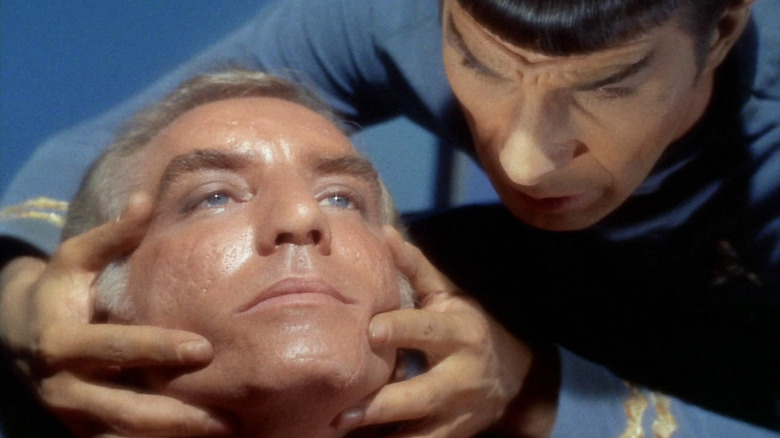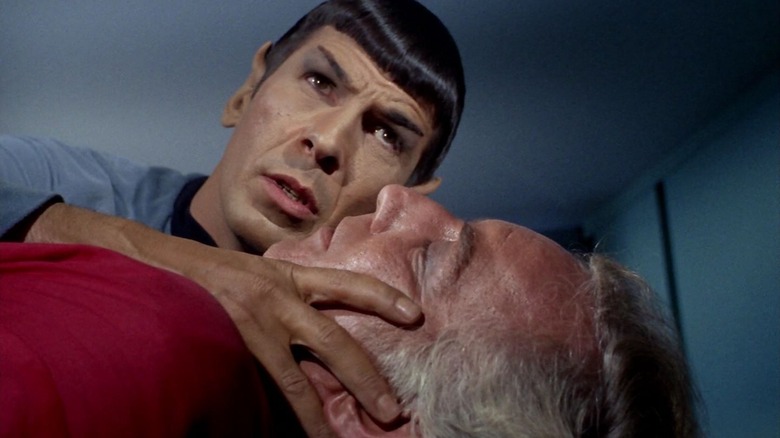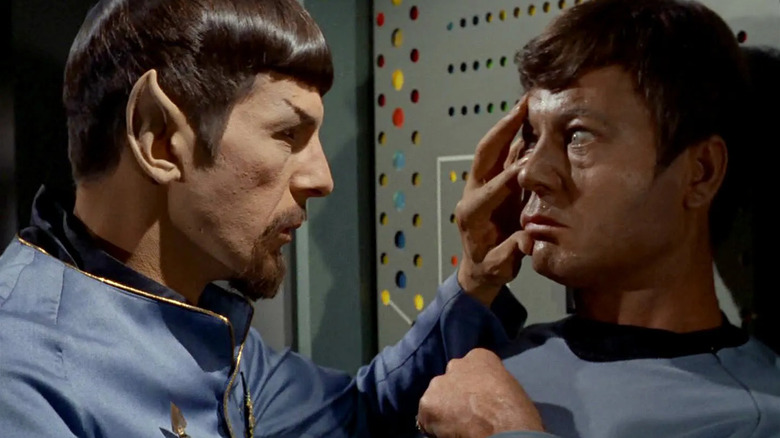Star Trek: Vulcans Can Only Mind-Meld Because Of NBC's Meddling
We may receive a commission on purchases made from links.
In 1843, a Scottish surgeon named James Braid published a book with the fun-to-say title of "Neurypnology," which is often cited as the earliest known instance of modern-day hypnosis used for medical purposes. The practice and terminology of hypnosis began to spread through the psychology community through the rest of the 19th century and into the 20th, and it was used openly during wartime as a valuable psychological tool for combatting PTSD. By the 1950s, hypnosis was has found mainstream approval around the world.
Of course, the mainstreaming of hypnosis caused some people to freak out a little. The thought that a hypnotist could put you to sleep and implant mental suggestions they could control, effectively making you their slave, frightened some people who didn't fully understand its medical applications. It didn't help that hypnosis had also proliferated as a popular form of stage entertainment, with eerie, cadaverous mesmerists bamboozling volunteers in creepy, shadowy venues. "Hypnosis" became, for many, synonymous with "mind control."
Hollywood, as is its wont, responded to hypnotism fears by producing no small number of hypnosis-based horror movies. Films like "Bride of the Monster" (1955), "The Hypnotist" (1957), "The Hypnotic Eye" (1960), and one of the greatest Cold War movies ever made, "The Manchurian Candidate" (1962), all employed hypnotism, as did just about every "Dracula" movie. These movies all presented hypnosis as something suspicious and terrifyingly real.
It seems that hypnosis was going to be an important part of an episode of "Star Trek" in 1966, but NBC balked at the idea. A 2017 article in CBR published a note from NBC wherein the studio expressed fears about a script in which the Vulcan character Spock (Leonard Nimoy) hypnotized a psychology patient. They thought a hypnosis scene would have an undue hypnotic effect on the audience, and they put the kibosh on the scene. The writers, to escape the studio's hypnosis fears, found a brilliant work-around. Vulcans can, they surmised, intuit the thoughts of others by touching their faces and performing a "mind-meld." And, lo, one of the most famous details of the "Star Trek" franchise was born.
Star Trek writers invented the Vulcan mind-meld because NBC was afraid of hypnosis
The "Star Trek" episode in question was "Dagger of the Mind" (November 3, 1966). The episode takes place on a distant space colony for the criminally insane. The overseeing doctor of the colony, Dr. Tristan Adams (James Gregory), has had incredible success curing and pacifying the mentally ill, to a degree that seems suspicious. Captain Kirk (William Shatner) and Spock (Leonard Nimoy) find that Dr. Adams has been making use of a torturous hypnosis device that can aggressively rip content out of people's brains, leaving them in his thrall. A man named Dr. Simon van Gelder (Morgan Woodward) knew about Dr. Adams' secret, but was unable to speak it aloud, as he has undergone brainwashing.
In the episode's original script written by Shimon Wincelberg (credited as S. Bar-David), Spock was to undo Dr. van Gelder's brainwashing by using a form of "alien hypnosis." Sadly, Spock's Vulcan hypnosis process is not described. It was weird, according to NBC, that an alien should be using hypnosis. If hypnosis was required, shouldn't that be handled by Spock's on-again-off-again professional nuisance, Dr. McCoy (DeForest Kelley)? The note read:
"In accordance with our precautions to avoid hypnotizing a viewer, the act of hypnotizing must be either out of context or done off-camera. Further, since you are portraying hypnotism as a legitimate medical tool, Van Gelder should be hypnotized by Dr. McCoy rather than Mr. Spock unless Mr. Spock can be established as being qualified in the use of this technique."
Wincelberg could have easily had McCoy do the hypnosis on van Gelder, or stated that it was something Spock was qualified to do, but the "Star Trek" honchos wanted to lean into Spock's alien-ness a little more, preferring to have the hypnosis be something only his species was capable of. No, Spock had to be the one.
NBC thought it was okay if hypnosis was done only by touch
But how to get around NBC's fears that its audience might be hypnotized? Simple: Make it a touch-only technique. Indeed, Spock had a line of dialogue in "Dagger of the Mind" explaining that the Vulcan mind-meld is unique: "This will not affect you, Dr. McCoy, only the person I touch. It is not hypnosis." He also explained that it was a very personal thing for Vulcans, usually only used as an intimate and spiritual practice. The final draft of the script read as follows:
"[Spock] places his hands at each side of the junction of neck and shoulder, his thumbs pressing deeply into van Gelder's torso. Spock seems to be feeling with his fingers for vessels and nerve endings. Van Gelder groans, writhes a bit ... Spock seems to be finding the pressure points he wants. He is analyzing what he feels, something of an expert safe-cracker feeling the action of mechanisms and tumblers through his fingers. Finally, he's ready."
Thereafter, touching and psychic abilities became a regular feature of Vulcans on "Star Trek," and even became major plot points later in the franchise. In "Star Trek II: The Wrath of Khan," Spock shunted his whole consciousness into Dr. McCoy's brain via mind-meld. The whole Vulcan subculture of mind-melds was explored in episodes of "Star Trek: Enterprise." And to think that it was all born of NBC execs being afraid of mass hypnosis.
There is some debate as to who originated the idea for a mind-meld. Wincelberg is likely the inventor, although Nimoy said in his autobiography, "I Am Spock," that show creator Gene Roddenberry came up with the idea. Roddenberry was notorious for riding on the coattails of others, however, so one cannot be sure if his claims are trustworthy.


